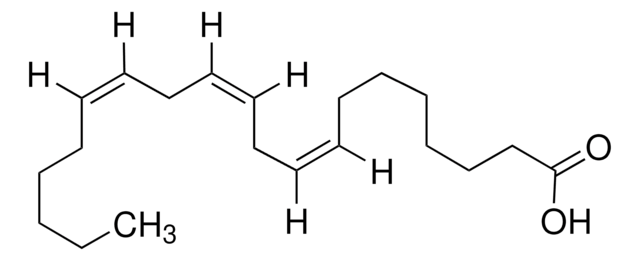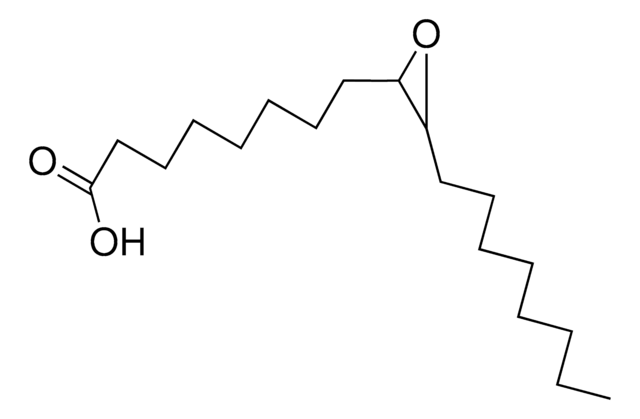E5641
11,12-Epoxy-(5Z,8Z,14Z)-eicosatrienoic acid
~100 μg/mL in ethanol, ≥95%
Synonym(s):
(±)11,12-EpETrE, 11,12-EET
Sign Into View Organizational & Contract Pricing
All Photos(1)
About This Item
Empirical Formula (Hill Notation):
C20H32O3
CAS Number:
Molecular Weight:
320.47
EC Number:
MDL number:
UNSPSC Code:
12352211
PubChem Substance ID:
NACRES:
NA.25
Recommended Products
Quality Level
Assay
≥95%
concentration
~100 μg/mL in ethanol
lipid type
omega FAs
storage temp.
−20°C
SMILES string
CCCCC\C=C\CC1OC1C\C=C\C\C=C\CCCC(O)=O
InChI
1S/C20H32O3/c1-2-3-4-5-9-12-15-18-19(23-18)16-13-10-7-6-8-11-14-17-20(21)22/h6,8-10,12-13,18-19H,2-5,7,11,14-17H2,1H3,(H,21,22)/b8-6+,12-9+,13-10+
InChI key
DXOYQVHGIODESM-ATELOPIESA-N
Packaging
Packaged under argon
Signal Word
Danger
Hazard Statements
Precautionary Statements
Hazard Classifications
Eye Irrit. 2 - Flam. Liq. 2
Storage Class Code
3 - Flammable liquids
WGK
WGK 1
Flash Point(F)
48.2 °F - closed cup
Flash Point(C)
9 °C - closed cup
Choose from one of the most recent versions:
Already Own This Product?
Find documentation for the products that you have recently purchased in the Document Library.
L Yang et al.
British journal of clinical pharmacology, 80(1), 28-44 (2015-02-07)
There is increasing evidence suggesting that epoxyeicosatrienoic acids (EETs) play an important role in cardioprotective mechanisms. These include regulating vascular tone, modulating inflammatory responses, improving cardiomyocyte function and reducing ischaemic damage, resulting in attenuation of animal models of cardiovascular risk
Yong Zhou et al.
Shock (Augusta, Ga.), 47(5), 638-645 (2016-10-19)
Acute lung injury (ALI) is characterized by rapid alveolar injury, vascular leakage, lung inflammation, neutrophil accumulation, and induced cytokines production leading to lung edema. The mortality rate of patients suffering from ALI remains high. Epoxyeicosatrienoic acids (EETs) are cytochrome P450-dependent
Huichen Zhao et al.
Laboratory investigation; a journal of technical methods and pathology, 97(7), 782-791 (2017-03-21)
Epoxyeicosatrienoic acids (EETs) are the epoxidation products of arachidonic acid catalyzed by cytochrome P450 (CYP) epoxygenases, which possess multiple biological activities. In the present study, we aimed to explore the role and effects of CYP epoxygenases/EETs in wound healing in
Yindi Ding et al.
The Journal of pharmacology and experimental therapeutics, 350(1), 14-21 (2014-04-26)
Cytochrome P450-derived epoxides of arachidonic acid [i.e., the epoxyeicosatrienoic acids (EETs)] are important lipid signaling molecules involved in the regulation of vascular tone and angiogenesis. Because many actions of 11,12-cis-epoxyeicosatrienoic acid (EET) are dependent on the activation of protein kinase
Jihong Lin et al.
Theranostics, 10(17), 7857-7871 (2020-07-21)
Rationale: Vasoregression secondary to glial activation develops in various retinal diseases, including retinal degeneration and diabetic retinopathy. Photoreceptor degeneration and subsequent retinal vasoregression, characterized by pericyte loss and acellular capillary formation in the absence diabetes, are also seen in transgenic
Our team of scientists has experience in all areas of research including Life Science, Material Science, Chemical Synthesis, Chromatography, Analytical and many others.
Contact Technical Service







